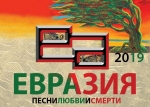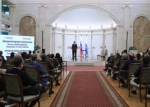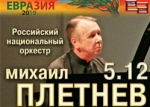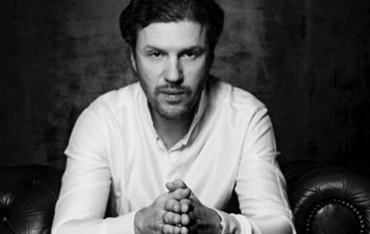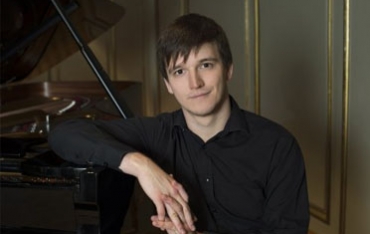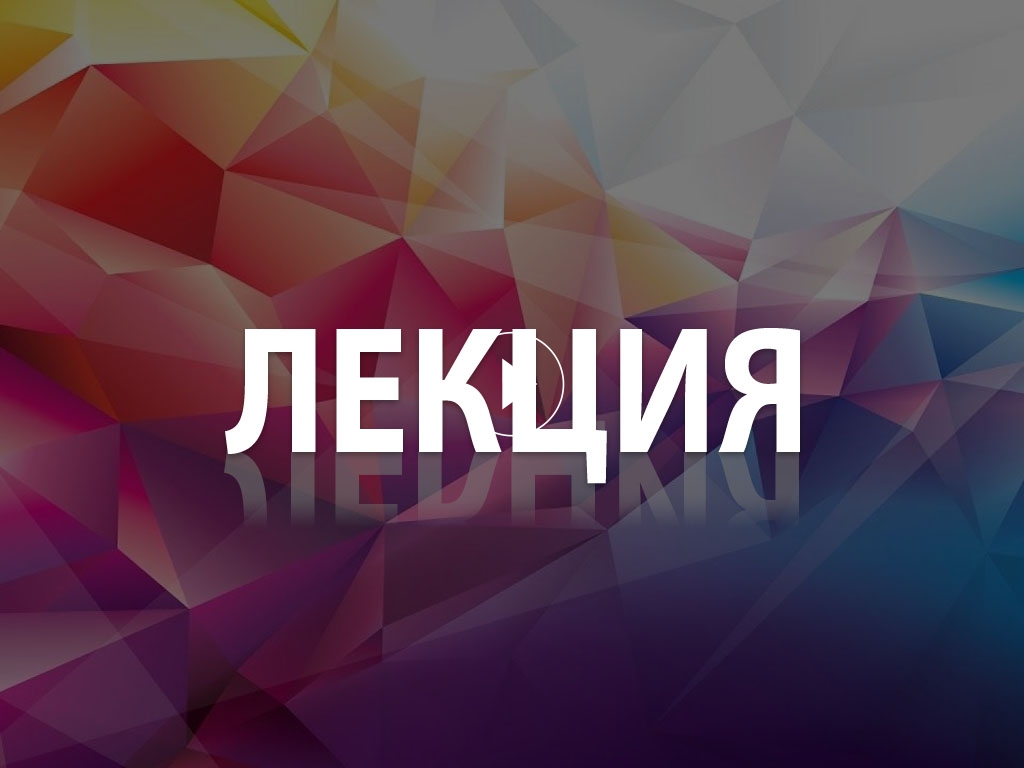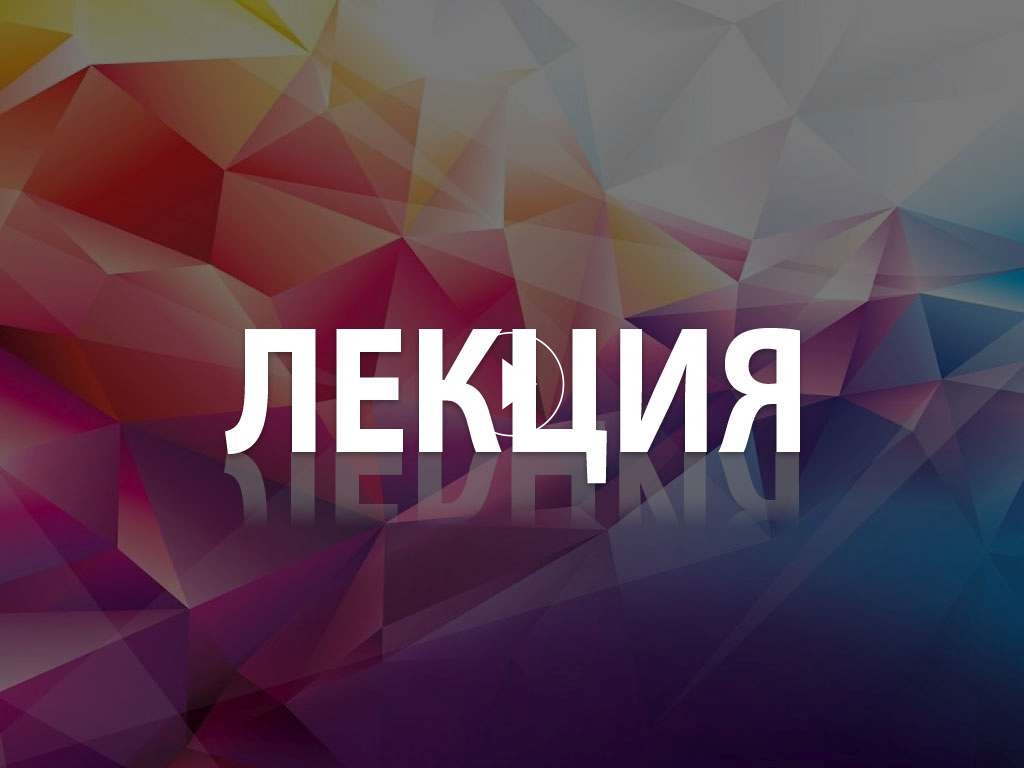Eurasia International Music Festival
Songs of Love and Death
Yekaterinburg will play host to the Eurasia International Music Festival for the fifth time. The initiator and organizer of the upcoming event is the Sverdlovsk Philharmonic. From November 29 through December 6, 2019, the Grand Hall of the Philharmonic welcomes musicians from Russia, France, Germany, Great Britain and Georgia. The Ural Philharmonic Orchestra (UPO) under the baton of Chief Conductor and Eurasia’s Artistic Director Dmitry Liss gives three performances. The festival is conceived as an intercontinental project built on the dialogue between Eastern and Western cultures and civilizations. The Tristan Triptych (also known as Tristan Trilogy) by Olivier Messiaen, the outstanding French composer of the 20th century, is the centerpiece event of the festival, making its full-performance debut in Russia.
Yekaterinburg is going to host Eurasia, the region’s largest music festival, for the fifth time. The festival brings together such big names as conductors Dmitry Liss, Dmitry Sinkovsky, Oliver Zeffman, Andrei Petrenko, pianists Pierre-Laurent Aimard, Mikhail Pletnev, Andreas Grau and Götz Schumacher, singer Julia Lezhneva (soprano), La Voce Strumentale Baroque Music Ensemble, Mdzlevari Ensemble (Georgia) and other world-class performers.The Ural Philharmonic Orchestra is the host orchestra of the festival.The core theme is Songs of Love and Death.
"The idea of the festival was inspired by our city's unique location on the border between Europe and Asia," Dmitry Liss says. "Here in Russia we cannot stay uninvolved in the dialogue between two civilizations. The Tatar Yoke brought centuries-long cross-cultural influences and interactions between two civilizations, two philosophies, two mentalities. How much does our mentality owe to the Western civilization and how big was the Eastern contribution? I strongly believe that Russia is a European country; however, centuries of the coexistence with eastern civilizations could not but leave their imprint on national archetypes. Even the national stereotype captured in the saying "The Russians are slow starters but they drive fast" correlates with the Eastern meditative traditions. Besides, intonational contacts in music are obvious – Russia has always been participating in the dialogue between East and West: it is well demonstrated by works of Mikhail Glinka, Alexander Borodin, Mily Balakirev, Nikolai Rimsky-Korsakov and many other composers. The so-called Russian East is an essential part of our culture."
The idea of cultural convergence the maestro is talking about was implemented during the first festival at several levels: the lineup of performers, concert programs, festival projects with participation of musicians from countries of Asia and commissioning of new compositions. The First Eurasia International Music Festival was held in 2011 and was dedicated to the 75th anniversary of the Sverdlovsk Philharmonic. Over the last years, the Eurasia Festival has welcomed symphony and chamber orchestras from Germany, Italy and China, early music groups and ensembles, such as the Amsterdam Baroque Soloists, L'Arpeggiata, Accademia Hermans and Hortus Musicus, conductors Michel Plasson, Ton Koopman, Kristjan Järvi and Benjamin Ellin, pianists Vassily Lobanov, Freddy Kempf, Fazıl Say, Lucas Debargue, Anton Batagov, Pierre-Laurent Aimard and Gerhard Oppitz, violinists Sayaka Shoji and Alena Baeva, the Arditti Quartet and many other world-class performers.
The highlights of the festival are Russian, European and world premieres, most of which were commissioned by Eurasia. The festival hosted the creations of Alexander Tchaikovsky’s Night in the Harem сello сoncerto, René Koering’s Chorale & Lamento, Leonid Desyatnikov’s Journey of the Fox to the North-West, Eun-Hwa Cho’s Concerto for Janggu and Orchestra, Toshio Hosokawa’s Fluss for string quartet and orchestra, Anton Batagov’s I See Your Dream, You See My Dream for piano and orchestra, Ivan Fedele’s UR and Yekaterinburg composer Olga Victorova’s mono-opera David's River. At the festival, the Russian audience was introduced to Fazıl Say’s 1001 Nights in the Harem violin concerto, The Isle is Full of Noises by Christos Hatzis and Concerto for Turntables and Orchestra no.1 by Gabriel Prokofiev. The Fifth Eurasia Festival also presents several Russian premieres, one of which takes place at its opening ceremony.
The Prelude and Isolde’s Liebestod (Love-Death) from Wagner’s opera Tristan und Isolde acts as a prologue to the festival program and its core theme Songs of Love and Death: the world has never known any other music that would represent both love and death so perfectly. The opening concert takes place on November 29 and its headliner is the Russian premiere of Das Floß der Medusa (The Raft of the Medusa), the oratorio by Hans Werner Henze, the prominent German composer of our time. Henze wrote the oratorio as a requiem for the Cuban revolutionary Ernesto Che Guevara in the wake of worldwide student unrest in 1968. Its premiere set for December, 1968 was abruptly called to a halt by the police, being followed by a political riot. The oratorio turned into an iconic composition representing its time similarly to Stravinsky’s Rite of Spring. Under the baton of Dmitry Liss, Das Floß der Medusa is to be performed by the Ural Philharmonic Orchestra, the Yekaterinburg Philharmonic Choir, Holger Falk (baritone), Sarah Wegener (soprano) and Vladimir Ognev (recitation). The oboe d'amore, heckelphone, contra-alto clarinet, bass trumpet and Wagner tuba parts are to be performed by soloists of the Bochum Symphony Orchestra and the Dortmund Philharmonic Orchestra.
The first and the final concerts gracefully overarch the festival: the Prelude and Isolde’s Liebestod – the song of doomed love will be responded by the song of triumphant love – Messiaen’s Turangalîla-Symphonie. The composer used to refer to it as an "Indian version" of Tristan and Isolde, directly pointing out that the exotic Oriental images were root-planted in the European soil. Turangalîla has been performed in Russia just a few times: it is scored for a very large orchestra with a large number of rare percussion instruments and the solo piano, let alone the ondes martenot, an early electronic instrument that generates sound waves. The solo part is performed by French pianist Pierre-Laurent Aimard who took part in the previous Eurasia festival, where his Bach and Debussy program was enthusiastically received by the audience. Aimard can easily understand Messiaen’s language: he had been the composer’s friend for many years; his interpretations of Messiaen’s music are deemed as perfect. The program includes another signature piece performed by Aimard – Piano Concerto No. 2 by Bartók whose compositions combine musical traditions of Western and Eastern Europe.
Another composition of Bartók – The Miraculous Mandarin ballet suite – tops off the performance of Oliver Zeffman (the UK) on December 2: one of the most promising conductors among his peers, he was a nominee for the Nestlé and Salzburg Young Conductors Award; he worked as an assistant with Valery Gergiev and David Zinman; he founded the Melos Sinfonia orchestra, which gave concerts in different countries, including Russia. Together with the Ural Youth Symphony Orchestra, he is going to present a truly Eurasian program where an utterly European composition (Edward Elgar's Cello Concerto with soloist Laura van der Heijden) meets an utterly Asian composition (A Flock Descends into the Pentagonal Garden by Japanese composer Toru Takemitsu), while the bridging function is performed by Debussy’s Prélude À L'après-Midi D'un Faune and The Miraculous Mandarin. The day before, the baroque music program (Corelli, Handel, Vivaldi and Graun) is to be presented by the magnificent world-renowned Russian singer Julia Lezhneva and La Voce Strumentale ensemble directed by Dmitry Sinkovsky.
Messiaen’s Tristan Triptych with Turangalîla as its central part makes its Russian debut at the Fifth Eurasia Festival. The program featuring another two parts of the triptych is the third anchor point of the forum, along with the opening and closing concerts. It is notable that everything is associated with the number three. The concert scheduled for December 3 has three parts: Harawi, a song cycle and the first part of Tristan Triptych, is performed by Maria Ostroukhova and Alexander Shaikin; the third and the final part – Cinq Rechants are to be performed by the Yekaterinburg Philharmonic Choir. The impressive program is capped off with another Russian premiere – Neruda Songs by Peter Lieberson for mezzo-soprano and orchestra: the song cycle composed by the American composer after the poems by the Chilean poet – another perfect example of cultural cross-pollination. Messiaen’s works are included in the next day program: Andreas Grau and Götz Schumacher, the celebrated participants of the previous festival, present a stunning program of 20th century music for piano duo and video projections.
As usual, Eurasia goes beyond the concert program and venues; the audience can meet performers, ask questions, get autographs and get a close-up look at exotic instruments. The first festival immediately demonstrated the audience’s interest in meet-the-artist events and autograph signing sessions followed by the traditional Yekaterinburg treat – a bird-cherry pie. The audience takes special interest in performers representing the eastern range of the vast festival palette: music lovers were captivated by the Hong Kong Orchestra playing traditional national instruments, by Azerbaijani mugham singers and musicians, by the Indian Classical Music Ensemble, by the Al-Tariqa Al-Gazoulia Ensemble (the Sufi ensemble, Egypt) and by the Sheikh Hamed Dawood Group (Syria). This year, the audience’s attention will be riveted on the Georgian ensemble Mdzlevari (the flock of singing birds) directed by Kakhaber Onashvili. The ensemble’s repertoire features choral and instrumental music of Georgia. At the concert on November 30, the ensemble performs church chants, folk songs of Georgia (sacred ritual, round dance and others) dating from the 12th century to the present day.
Over eight years of its existence, the Eurasia International Music Festival has come a long way: wide audiences as well as Russian and international professional communities were introduced to the vibrant palette of the musical landscape of Europe and Asia. The journey goes on through time and space and it is proved by the program of the Fifth Festival, which remains true to itself, to performers and audiences. One of the most iconic compositions capturing the dialogue between the civilizations – Rimsky-Korsakov's Scheherazade – was performed earlier at the festival; now the audience can hear its performance by the Russian National Orchestra (December 5; the program also includes Tchaikovsky’s Piano Concerto No. 1, soloist Mikhail Pletnev).
"Russia gave impetus to the French music, having influenced Claude Debussy, Maurice Ravel, composers of Les Six," the Artistic Director of the Festival, maestro Dmitry Liss says. "It was Diaghilev’s Russian Seasons that sparked European musicians’ interest in orientalism, in Oriental culture. Rimsky-Korsakov's Scheherazade was followed by Ravel’s Shéhérazade; then Olivier Messiaen and, later on, minimalists made their contribution, trying to combine elements of Eastern cultures and European music. In the meantime, composers from Asian countries, among them Toru Takemitsu, Tan Dun and many others, started dressing their music in European clothes. The dialogue is full of an inexhaustible vigor. The festival justifies its name: it was born and takes place here, on the border between Europe and Asia."
Ilya OVCHINNIKOV



